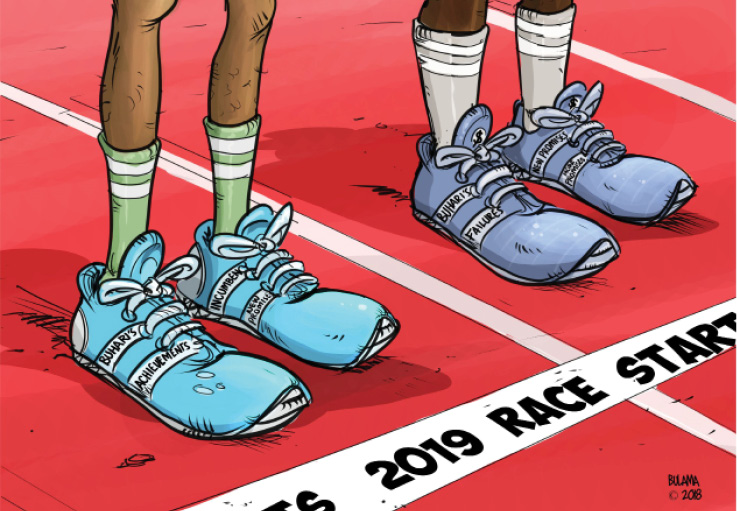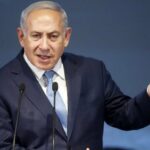Barely few weeks to the commencement of the 2019 general elections, it is obvious that the old culture of street fighting, thuggery, wielding of dangerous weapons at members of opposition parties, reckless driving of cars and wild riding of motorcycles, all of which used to characterize electioneering activities has considerably shrunk; and no longer business as usual.
This time around, political rallies have, so far, not been flamboyantly characterized with ‘free lunch’ and lavish distribution of bags or sacks of rice, salt, milk, sugar and clothes (atampa in Hausa) by aspirants to their spectators and supporters. The usual blocking of roads in order to hold political rallies as well as the unnecessary obstruction of traffic by political aspirants’ convoys also seem to have drastically reduced.
Even jingles in the electronic media (radio and television) appear to be limited. At present, such is mostly explored by big-time contenders such as presidential and governorship aspirants. Billboards, for now, seem to be the most widely used means of campaigning by all classes of aspirants. A new trend in billboard advertisements is the display of photographs of all aspirants in one political party from one senatorial district across elective offices on a single billboard. This suggests a link, however remote, with the seemingly ‘reduced’ funding of political campaigns by politicians for the upcoming 2019 general election. There could also be other reasons to justify this trend. In the past, every aspirant had his own billboard.
For now, we have also not seen clips of hate speeches on television channels (including AIT), newspapers and other media outfits, which unfortunately, characterized the 2015 elections. Section 95 (1) and (2) of the 2010 Electoral Act as amended prohibits the use of abusive, slanderous and base language by politicians in their political slogans or campaigns. To also avert thuggery, section 227 of the Constitution of the Federal Republic of Nigeria as amended states “No person or association shall retain, organize, train, or equip any person or group of persons for the purpose of enabling them to be employed for the use or display of physical force or coercion in promoting any political objective or interest or in such manner as to arouse reasonable apprehension”.
The assumptions of this writer in this piece are not oblivious of some absurdities that may be happening in some parts of the country. What is certain is that the occurrence of political misconducts among partisan politicians and their fanatical supporters is not on a large scale, which was a general experience in the past. For example, the Cross River State Police Command issued a statement on Wednesday 9, 2019 warning supporters of the Peoples Democratic Party (PDP) and the All Progressive Congress (APC) to desist from destroying billboards of governorship candidates across the state. The warning which was issued through the Command’s Public Relations Officer (PRO), DSP Irene Ugbo, was sequel to the complaints made by the governorship candidates of both political parties following the destruction of their billboards by some alleged thugs. It was also reported within the week that the flag-off of the APC campaign in Lagos caused huge traffic gridlock especially the Ikeja area of Lagos. The event was reportedly marred by commotion.
While the possibility of politicians deploying hoodlums to perpetrate unwholesome political activities cannot completely be ruled out within the limited time left for campaigning (since no time is too short for a criminally-minded individual to cause trouble), the impact even when politicians do so, is not likely to be appalling. We hope so because the period that could be manipulated for orchestrating political misdemeanours is virtually brief. By this time in 2011 and 2015, crazy tendencies already become the norm among politicians.
In his New Year message to Nigerians on January 1, 2019, President Muhammadu Buhari who is seeking re-election for second term during the February 16 presidential election said “Elections need not be a do-or-die affair, and we should not approach that eventuality in a democracy with trepidation and moral fear”. He also said “Happily, a large number of presidential candidates are committed to peace”. It is therefore needless of any contestant or his supporters to, out of excessive desperation, engage in hostile campaigns or rallies.
To explain the new face of electioneering culture in Nigeria, few insinuations come to mind. Topmost is the general perception that the stupendous money that would have been spent and squandered isn’t much there; as was the case in previous elections. This allusion, if it is anything plausible, could be responsible for the rather ‘low key’ electioneering activities. Many who would have utilized huge resources they supposedly looted from the nation’s public treasury have been de-possessed of such criminally acquired wealth by anti-graft agencies especially the Economic and Financial Crimes Commission (EFCC) under the ever dauntless police officer, Ibrahim Magu. Others whose looting activities have not been discovered are also afraid to deploy inexplicable resources to fund political rallies. From the foregoing analysis, there seems to be hypothetical co-relation between resources and expenditure. It shows that if funds are limited, expenditure will equally be moderate.
Another conceivable reason to explain the emerging trend in political campaigns is Independent National Electoral Commission (INEC)’s declaration of its intention to, this time, enforce provisions of the country’s Electoral Act which defines the limit of electioneering expenses incurable by aspirants.
To further ingrain the relative wind of decency blowing and filtering electioneering activities across political parties, we appeal to traditional rulers to continue to ‘preach’ to politicians to shun violence, eschew hate speech and avoid the use of vulnerable groups as thugs. While we urge personnel of the Federal Road Safety Corps (FRSC) to enforce compliance to traffic rules and regulation during political rallies, we encourage the Nigeria Police to ensure that public peace, law and order are not breached by politicians and their supports. This should be done without being partisan or showing preference to any political party or contestant in the discharge of its constitutional responsibility. May Allah (SWT) guide us to cherish and preserve global best practices in electioneering activities, amin.

 Join Daily Trust WhatsApp Community For Quick Access To News and Happenings Around You.
Join Daily Trust WhatsApp Community For Quick Access To News and Happenings Around You.


